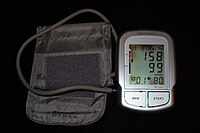
Photo from wikipedia
Introduction Blunted nighttime blood pressure (BP) dipping is prognostic of cardiovascular morbidity and mortality. Patients with coronary heart disease (CHD) are often characterized by a blunted nighttime BP dipping pattern.… Click to show full abstract
Introduction Blunted nighttime blood pressure (BP) dipping is prognostic of cardiovascular morbidity and mortality. Patients with coronary heart disease (CHD) are often characterized by a blunted nighttime BP dipping pattern. The present study compared the effects of 2 behavioral intervention programs, aerobic exercise (EX) and stress management (SM) training, with a usual care (UC) control group on BP dipping in a sample of CHD patients. Methods This was a secondary analysis of a randomized, controlled trial with allocation concealment and blinded outcome assessment in 134 patients with stable CHD and exercise‐induced myocardial ischemia. Nighttime BP dipping was assessed by 24‐hour ambulatory BP monitoring, at prerandomization baseline and after 16 weeks of one of the following treatments: usual medical care; UC plus supervised aerobic EX for 35 minutes, 3 times per week; UC plus weekly 1.5‐hour sessions of SM training. Results The EX and SM groups exhibited greater improvements in systolic BP dipping (P = .052) and diastolic BP dipping (P = .031) compared with UC. Postintervention systolic BP percent‐dipping means were 12.9% (SE = 1.5) for SM, 11.1% (SE = 1.4) for EX, and 8.6% (SE = 1.4) for UC. Postintervention diastolic BP percent‐dipping means were 13.3% (SE = 1.9) for SM, 14.1% (SE = 1.8) for EX, and 8.8% (1.8) for UC. Conclusions For patients with stable CHD, EX or SM training resulted in improved nighttime BP dipping compared with usual medical care. These favorable effects of healthy lifestyle modifications may help reduce the risk of adverse clinical events.
Journal Title: American Heart Journal
Year Published: 2017
Link to full text (if available)
Share on Social Media: Sign Up to like & get
recommendations!